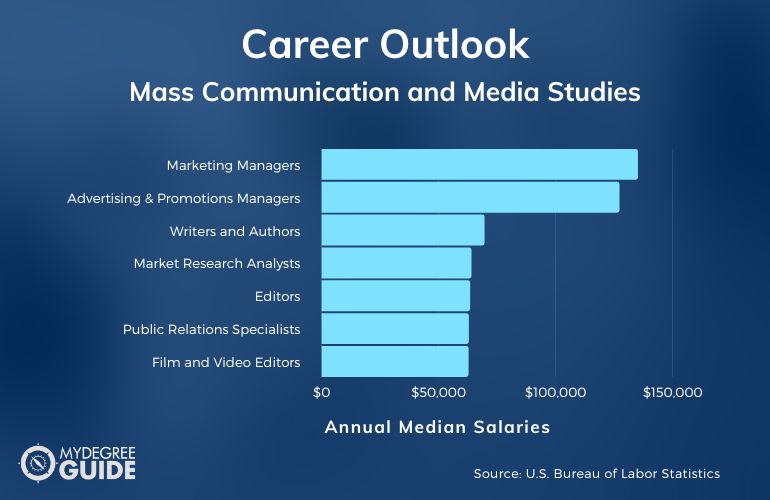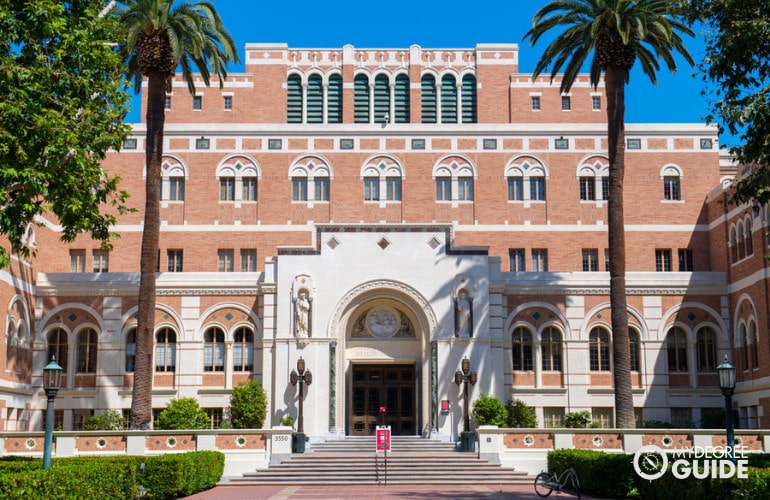If the idea of getting your message across to many people excites you, then an online mass communication degree might be a good fit.

If there’s one trait that’s important in practically every job, it’s being a good communicator. In fact, communication is now a highly sought-after skill. Companies are producing more content than ever, and mass media is already a huge part of people’s lives.
Editorial Listing ShortCode:
A degree in mass communications can help pave the way for many future-ready career paths in this growing field.
Universities Offering Online Bachelors in Mass Communications Degree Programs
Methodology: The following school list is in alphabetical order. To be included, a college or university must be regionally accredited and offer degree programs online or in a hybrid format.
Arizona State University
Arizona State University offers a Bachelor of Arts in Mass Communication and Media Studies. Each class is 7.5 weeks long and offered online. To graduate, students must complete 120 credit hours. Applicants must have a minimum GPA of 3.0, an ACT score of 22, or an SAT score of 1120.
Arizona State University is accredited by the Higher Learning Commission of the North Central Association of Colleges and Schools.
CUNY School of Professional Studies
The CUNY School of Professional Studies offers a Bachelor of Arts in Communication and Media. The online program requires students to complete 120 credit hours to graduate. To be eligible for the program, applicants must have 24 transferable credits with a minimum GPA of 2.5 from another post-secondary institution.
CUNY School of Professional Studies is accredited by the Middle States Commission on Higher Education.
Drake University
Drake University offers an online program for a Bachelor of Arts in Journalism and Mass Communication. Students must transfer in 60 credit hours and complete an additional 64 credits to graduate. Applicants must have an associate’s degree with a minimum GPA of 2.5 to be eligible for the program.
Drake University is accredited by the Higher Learning Commission.
Louisiana State University
Louisiana State University offers an online program for a Bachelor of Arts in Mass Communication with an emphasis in Public Relations. To graduate, students must complete 120 credit hours. Those interested in the program must have a high school GPA of 3.0 or higher and ACT or SAT test scores.
Louisiana State University is accredited by the Southern Association of Colleges and Schools Commission on Colleges.
Loyola University – New Orleans
Loyola University—New Orleans offers a Bachelor of Arts in Mass Communication. The program can be completed online and requires students to complete 120 credit hours to graduate. To be eligible for the program, applicants must submit ACT or SAT test scores, a personal essay, and official transcripts with their application.
Loyola University – New Orleans is accredited by the Southern Association of Colleges and Schools Commission on Colleges.
Montana State University – Billings
Montana State University—Billings offers a Bachelor of Arts in Communication with a Mass Communication track. To graduate, students must complete 120 credit hours. Those interested in the program may apply online through the school’s website. ACT or SAT test scores are not required but encouraged by the program’s admissions department.
Montana State University Billings is accredited by the Northwest Commission on Colleges and Universities.
Southern Illinois University
Southern Illinois University offers a Bachelor of Arts in Journalism with a concentration in Journalism and Mass Communication. To graduate, students must complete 120 credit hours, including a minor approved by the university. Applicants must have a minimum GPA of 2.75 or equivalent ACT or SAT test scores.
SIU is accredited by the Higher Learning Commission.
SUNY – Oswego
SUNY—Oswego offers an online program for a Bachelor of Arts in Broadcasting and Mass Communication. It can typically be completed in 2 years and requires students to complete 48 credit hours to graduate. To be eligible for the program, applicants must have an associate’s degree in a relevant field. Applicants are accepted year-round.
SUNY Oswego is accredited by the Middle States Commission on Higher Education.
University of Arkansas – Little Rock
The University of Arkansas—Little Rock offers a Bachelor of Arts in Mass Communication with an emphasis in Mass Media. Students must complete 120 credit hours with a minimum GPA of 2.0 to graduate. Applicants must submit high school transcripts and ACT or SAT test scores.
The University of Arkansas at Little Rock is accredited by the Higher Learning Commission.
University of New Mexico
The University of New Mexico offers a Bachelor of Arts in Journalism and Mass Communication with a concentration in Strategic Communication. Each class is 8 weeks long and offered online. Applicants must submit copies of their high school transcripts with their applications. ACT or SAT test scores are not required but encouraged by the program’s admissions department.
The University of New Mexico is accredited by the Higher Learning Commission.
Online Mass Communication Degrees

Mass communication is an interdisciplinary field that studies how to express information through mass media. Some examples of mass media would be:
- TV and film
- Advertising
- Websites and social media
- Books and magazines
- Press releases
- Videos and podcasts
- Photography
With mass communication, the focus is on reaching a large number of people. An online degree in mass communication teaches both analytical and storytelling skills. The communications major can learn how to analyze the contents and effects of media, and can also get experience with using storytelling and marketing to convey messages clearly.
A lot of undergraduates go for a mass communication degree because it can help prepare them for a wide variety of roles. Some graduates with this degree become public relation specialists who manage the reputation of their clients. They might also work in creative roles as designers, writers, and photographers. Other possible industries include digital marketing, film and TV production, journalism, and advertising.
The coursework for an online mass communication degree involves basic core courses along with more specialized communication courses. Most programs take up mass communication theory, media laws and ethics, basic public relations, and digital communication. You might be able to choose electives or even specialize in a particular form of media.
Mass Communication and Media Studies Careers & Salaries

With an online mass communications degree, there are multiple careers and industries that you can pursue. Many graduates work in sectors such as information services, broadcasting and publishing, the performing arts, and professional organizations. Being self-employed is another option.
According to the Bureau of Labor Statistics, there is a wide range of media and communication positions. As a whole, careers in communication tend to have higher than average salaries.
| Careers | Annual Median Salaries |
| Marketing Managers | $135,030 |
| Advertising and Promotions Managers | $127,150 |
| Writers and Authors |
$69,510 |
| Market Research Analysts | $63,920 |
| Editors | $63,350 |
| Public Relations Specialists | $62,800 |
| Film and Video Editors | $62,680 |
| Graphic Designers | $50,710 |
| News Analysts, Reporters, and Journalists | $48,370 |
| Announcers | $45,810 |
The Bureau of Labor Statistics predicts that there will be more demand for many of these occupations over the next several years. Some occupations with higher growth rates include advertising, promotions, and marketing managers (10% job growth), public relations specialists (11%), market research analysts (22%), and film and video editors (33%).
Bachelor in Mass Communication Curriculum & Courses

Online degree programs for mass communication tend to offer similar core courses. Students can then select electives based on what they want to specialize in. Some programs even offer separate tracks for public relations, journalism, and visual communication.
Most bachelor in mass communication programs offer courses similar to the following:
- Mass Communication Theory: This course delves into the most common concepts and trends in mass communication, along with their effects on society.
- Communication Writing: You’ll learn how to write effectively with the audience in mind, from formal business documents to video scripts and feature articles.
- Digital Communication: This course examines how messages are conveyed through online platforms, such as social media, email, videos, and websites.
- Law of Mass Communication: This course tackles important legal issues in media and communication, including copyright and intellectual property.
- Integrated Marketing Methods: You’ll analyze popular marketing strategies across both traditional and emerging media and formulate your own marketing plan.
- Visual Communication: This course provides an overview of the principles of design and how these can be used for storytelling, persuasion, and branding.
- Introduction to Public Relations: This course focuses on how organizations and public figures present themselves and manage their relationships with specific markets and stakeholders.
- Research Methods in Mass Communication: This course dives into several research tools and approaches, including content analysis, focus groups, and experiments.
- Organizational Communication: You’ll examine the inner dynamics of organizations of different sizes and assess how to improve these to make organizations more productive.
- Video Production: This hands-on course prepares students to do basic post-production for video, film, and TV, all the way from writing to shooting and editing.
On top of the required coursework, you might also have to do an internship or complete a thesis project to graduate.
How to Choose a Mass Communications Online Degree Program

With all of the communications degree online programs out there for mass communication, it can be tricky to determine which one is right for you. Before committing to a program, it may help to run through the following checklist:
- Accreditation. A school with regional accreditation is often more credible. The Accrediting Council on Education in Journalism and Mass Communications (ACEJMC) also gives accreditation to specific MassCom programs.
- Coursework. The coursework for a program is usually available online. As an alternative, you can request it through email. If you already have a specialization in mind, such as video editing or marketing, you’ll most likely want a program that offers electives in those areas.
- Degree length and format. Some programs require you to attend online classes live, while others are more flexible. There are programs too where you might have to visit the campus for a quick orientation at the start.
- Faculty. You can often see at least some of the faculty of a program listed on the school website. This can allow you to check the credentials of the professors. The more that these match up with your career goals and interests, the more well-suited the program might be for you.
- Internship support. Some mass communications degrees require an internship. In any case, it’s helpful if a program has an internship coordinator so you can more easily get access to hands-on experience.
In addition, you can attend online orientations to get more information about a program. You could also reach out directly to a prospective school’s admissions office.
Online Mass Communication Degree Admissions Requirements

The exact requirements for an online mass communication degree varies from one program to the next, but these are some of the most common:
- Online application form. Online programs often have application forms uploaded on their website, which you can easily fill out and submit right away.
- High school transcripts. Nearly all online media communications degree programs ask for transcripts as proof that you’ve graduated from high school.
- Minimum GPA. Some schools state a minimum GPA for you to get accepted, usually at around 2.0 or above.
- SAT or ACT scores. Standardized test scores aren’t always required, but some schools strongly recommend them. They may also strengthen your application.
Admissions departments may also request a statement of interest or list of activities so they can get to know you better.
Accreditation

Accreditation is often a top consideration when choosing an online mass communication degree. If a college or university has regional accreditation, it means that their programs have been reviewed by an accrediting board and meet quality standards.
Taking a program at an accredited school can come with plenty of benefits. For example, you can apply to federal financial aid programs, and some employers may look more favorably at your application if you studied at an accredited school.
To see whether the online mass communication degree program you’re considering is accredited, you can visit the US Department of Education’s website.
Financial Aid and Scholarships

Tuition for an undergraduate degree can be costly, but there are multiple financial aid options available to qualifying students.
Loans and grants are regularly offered by both the federal government and individual state governments. Student loans are the easiest to obtain, but you’ll have to pay them back after graduating. On the other hand, grants don’t have to be paid back. To apply for financial aid, you can fill out the Free Application for Federal Student Aid (FAFSA).
Scholarships from public and private organizations are also available. These can include the National Academy of Television Arts and Sciences (NATAS) scholarships and the Richard G. Zimmerman Journalism scholarship.
What Is a Mass Communication Degree?

A mass communication degree is an undergraduate degree that focuses on how information is shared with large audiences.
There’s a lot of emphasis on the different mediums that can be used, such as social media, magazines, radio, film, television, and broadcasting. It also studies the impact of this messaging on society, including how people react and how their beliefs and behavior change as a result.
There’s often a strong hands-on component to a mass communication degree. Going beyond theory, it also places importance on practical application, teaching students how to convey information effectively across a variety of mediums.
Is Mass Communications a Good Major?

Yes, mass communication is a good major for many undergraduate students. The Bureau of Labor Statistics predicts that jobs in media and communication will grow by 14% over the next ten years.
In general, there is a rising demand for creating content and communicating information, which is exactly what mass communications is all about. In fact, the median annual wage for the median and communication sector is $62,340, which is higher than average.
A mass communication major can offer plenty of flexibility in terms of which career path to choose. For example, many graduates end up working in marketing, sales, public relations, and film.
What Can You Do with a Mass Communications Degree?

Once you’ve obtained a mass communications degree, there are multiple career paths that you may be qualified for.
One popular track is media and journalism. Some mass communication degree graduates work as reporters, videographers, producers, scriptwriters, and announcers. Others choose to work in corporate communication, in roles such as market research analysts, technical writers, public relations specialists, and designers. Graduates who pursue this path may either be self-employed or part of an organization.
Those who want to work in academia as a professor or researcher go on to pursue graduate studies in mass communication or a complementary field.
How Long Does It Take to Get a Bachelors in Mass Communication Online?
Traditional undergraduate degree programs typically take 4 years to finish if you’re studying full-time. Many online degrees, though, are open to alternative schedules. For instance, programs that follow 8 week terms may allow you to finish faster with full-time, year-round studies.
Part-time students naturally take longer to complete their degree, but for some this can be the most convenient setup for juggling other life demands. Some online programs are self-paced, allowing you to adjust your time to completion as long as you fulfill all of the credits.
What’s the Difference Between Mass Media vs. Mass Communication?

You’ll often see mass media and mass communication mentioned together when reading about degree programs, but there are differences between the two terms.
- Mass media: Mass media refers to the platforms that are used for mass communication.
- Mass communication: Mass communication refers to the act of sending messages to a large audience. A mass communication degree has a wider scope, with more theory than a mass media degree.
Despite these differences, more programs are combining the two, resulting in a hybrid mass media communications degree.
Is a Mass Communication and Media Studies Degree Worth It?

Yes, a mass communication and media studies degree is worth it for many students. According to the Bureau of Labor Statistics, roles in media and communication are expected to grow 14% over the next ten years, which is much faster than average.
Businesses across all industries are becoming more reliant on digital media and marketing, and this is a trend that will keep on rising in the near future. The skills that are taught in a mass communication and media studies degree can be applicable to many areas of life. Even if you don’t pursue a related career, knowing how to communicate well is a beneficial skill set.
Getting Your Mass Communications Degree Online

Information is being consumed at a faster pace now than ever, and the world of media is evolving in exciting ways. Getting your mass communications degree online can be an entry point into highly valued industries, such as entertainment, marketing, and advertising.
Aside from honing your writing and speaking skills, a mass communication degree will also train you in problem-solving and critical analysis. You can get exposed to different kinds of media platforms and gain a deeper understanding of how branding works.
Online mass communication degrees are now more accessible than ever. You can check out accredited schools and start laying the foundation for your future career with a mass communications degree.
